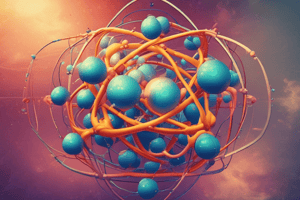Podcast
Questions and Answers
What is the difference between the atomic number and mass number of an isotope?
What is the difference between the atomic number and mass number of an isotope?
- The atomic number is the total number of protons, while the mass number is the total number of protons and neutrons (correct)
- The atomic number is the total number of electrons, while the mass number is the total number of protons
- The atomic number is the total number of neutrons, while the mass number is the total number of electrons
- The atomic number is the total number of protons and neutrons, while the mass number is the total number of electrons
Which of the following electron configurations is not a noble gas configuration?
Which of the following electron configurations is not a noble gas configuration?
- 1s2 2s2 2p6 3s2 3p6
- 1s2 2s2 2p6
- 1s2
- 1s2 2s2 2p4 (correct)
What is the number of valence electrons in an atom of neon (Ne) in its ground state?
What is the number of valence electrons in an atom of neon (Ne) in its ground state?
- 6
- 10
- 2
- 8 (correct)
Which of the following statements about the Bohr model is false?
Which of the following statements about the Bohr model is false?
What is the isotope symbol for an atom with 12 protons and 14 neutrons?
What is the isotope symbol for an atom with 12 protons and 14 neutrons?
Flashcards are hidden until you start studying
Study Notes
Atomic Structure
- An atom consists of a nucleus, protons, neutrons, and electrons.
- The nucleus is the central part of the atom, containing protons and neutrons.
- Protons are positively charged particles found in the nucleus, with a charge of +1.
- Neutrons are particles with no charge, also found in the nucleus, with a mass of 1 amu.
- Electrons are negatively charged particles orbiting the nucleus, with a charge of -1.
Isotopic Symbols and Atomic Structure
- Isotopic symbols are used to represent an atom, with the format:
A/Z X, whereAis the mass number,Zis the atomic number, andXis the symbol of the element. - The atomic number (
Z) determines the number of protons in an atom. - The mass number (
A) is the sum of protons and neutrons in an atom.
Atomic Number and Mass Number
- The atomic number (
Z) is the number of protons in an atom, which determines the element. - The mass number (
A) is the sum of protons and neutrons in an atom, which determines the isotope.
Bohr Model
- The Bohr model describes the arrangement of electrons in an atom, with electrons orbiting the nucleus in energy levels.
- Electrons jump to higher energy levels when they gain energy and fall to lower energy levels when they lose energy.
Electron Configuration
- The electron configuration of an atom can be written using the Bohr model.
- The electron configuration of the first 20 elements can be written as follows:
- H: 1s1
- He: 1s2
- Li: 1s2 2s1
- ...
- Ca: 1s2 2s2 2p6 3s2 3p6 4s2
Valence Shell and Valence Electrons
- The valence shell is the outermost energy level of an atom.
- The valence shell of atoms of the first 20 elements can be identified.
- The number of valence electrons for atoms of the first 20 elements can be determined.
- Valence electrons are involved in chemical reactions.
Noble Gas Configuration
- The noble gas configuration is a stable electron configuration, with a full outer energy level.
- Examples of noble gas configurations include: He (1s2), Ne (1s2 2s2 2p6), and Ar (1s2 2s2 2p6 3s2 3p2).
- The noble gas configuration is important because it represents a stable state, with a full outer energy level.
Studying That Suits You
Use AI to generate personalized quizzes and flashcards to suit your learning preferences.




